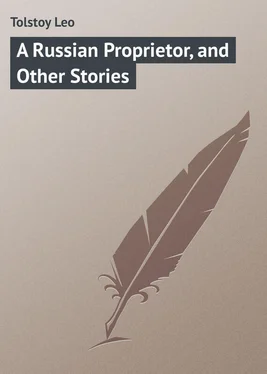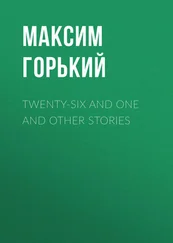Leo Tolstoy - A Russian Proprietor, and Other Stories
Здесь есть возможность читать онлайн «Leo Tolstoy - A Russian Proprietor, and Other Stories» — ознакомительный отрывок электронной книги совершенно бесплатно, а после прочтения отрывка купить полную версию. В некоторых случаях можно слушать аудио, скачать через торрент в формате fb2 и присутствует краткое содержание. Жанр: Русская классическая проза, на английском языке. Описание произведения, (предисловие) а так же отзывы посетителей доступны на портале библиотеки ЛибКат.
- Название:A Russian Proprietor, and Other Stories
- Автор:
- Жанр:
- Год:неизвестен
- ISBN:нет данных
- Рейтинг книги:4 / 5. Голосов: 1
-
Избранное:Добавить в избранное
- Отзывы:
-
Ваша оценка:
- 80
- 1
- 2
- 3
- 4
- 5
A Russian Proprietor, and Other Stories: краткое содержание, описание и аннотация
Предлагаем к чтению аннотацию, описание, краткое содержание или предисловие (зависит от того, что написал сам автор книги «A Russian Proprietor, and Other Stories»). Если вы не нашли необходимую информацию о книге — напишите в комментариях, мы постараемся отыскать её.
A Russian Proprietor, and Other Stories — читать онлайн ознакомительный отрывок
Ниже представлен текст книги, разбитый по страницам. Система сохранения места последней прочитанной страницы, позволяет с удобством читать онлайн бесплатно книгу «A Russian Proprietor, and Other Stories», без необходимости каждый раз заново искать на чём Вы остановились. Поставьте закладку, и сможете в любой момент перейти на страницу, на которой закончили чтение.
Интервал:
Закладка:
At the present moment, notwithstanding the heat of the June day, Davidka, with his head covered by his sheep-skin, 32 32 polushubok.
was fast asleep, curled up on one corner of the oven. The panic-stricken hen, skipping up on the oven, and growing more and more agitated, took up her position on Davidka's back, but did not awaken him.
Nekhliudof, seeing no one in the hovel, was about to go, when a prolonged humid sigh betrayed the sleeper. 33 33 khozyáïn.
"Holloa! who's there?" cried the prince.
A second prolonged sigh was heard from the oven.
"Who's there? Come here!"
Still another sigh, a sort of a bellow, and a heavy yawn responded to the prince's call.
"Well, who are you?"
Something moved slightly on the oven. The skirt of a torn sheep-skin 34 34 tulup.
was lifted; one huge leg in a dilapidated boot was put down, then another, and finally Davidka's entire figure emerged. He sat up on the oven, and rubbed his eyes drowsily and morosely with his fist.
Slowly shaking his head, and yawning, he looked down into the hut, and, seeing the prince, began to make greater haste than before; but still his motions were so slow, that Nekhliudof had time to walk back and forth three times from the puddle to the loom before Davidka got down from the oven.
Davidka Byélui or David White was white in reality: his hair, and his body, and his face all were perfectly white.
He was tall and very stout, but stout as peasants are wont to be, that is, not in the waist alone, but in the whole body. His stoutness, however, was of a peculiar flabby, unhealthy kind. His rather comely face, with pale-blue good-natured eyes, and a wide trimmed beard, bore the impress of ill health. There was not the slightest trace of tan or blood: it was of a uniform yellowish ashen tint, with pale livid circles under the eyes, quite as though his face were stuffed with fat or bloated.
His hands were puffy and yellow, like the hands of men afflicted with dropsy, and they wore a growth of fine white hair. He was so drowsy that he could scarcely open his eyes or cease from staggering and yawning.
"Well, aren't you ashamed of yourself," began Nekhliudof, "sleeping in the very best part of the day, 35 35 Literally, "middle of the white day."
when you ought to be attending to your work, when you haven't any corn?"
As Davidka little by little shook off his drowsiness, and began to realize that it was the prince who was standing before him, he folded his arms across his stomach, hung his head, inclining it a trifle to one side, and did not move a limb or say a word; but the expression of his face and the pose of his whole body seemed to say, "I know, I know; it is an old story with me. Well, strike me, if it must be: I will endure it."
He evidently was anxious for the prince to get through speaking and give him his thrashing as quickly as possible, even if he struck him severely on his swollen cheeks, and then leave him in peace.
Perceiving that Davidka did not understand him, Nekhliudof endeavored by various questions to rouse the peasant from his vexatiously obstinate silence.
"Why have you asked me for wood when you have enough to last you a whole month here, and you haven't had any thing to do? What?"
Davidka still remained silent, and did not move.
"Well, answer me."
Davidka muttered something, and blinked his white eyelashes.
"You must go to work, brother. What will become of you if you don't work? Now you have no grain, and what's the reason of it? Because your land is badly ploughed, and not harrowed, and no seed put in at the right time, – all from laziness. You asked me for grain: well, let us suppose that I gave it to you, so as to keep you from starving to death, still it is not becoming to do so. Whose grain do I give you? whose do you think? Answer me, – whose grain do I give you?" demanded Nekhliudof obstinately.
"The Lord's," muttered Davidka, raising his eyes timidly and questioningly.
"But where did the Lord's grain come from? Think for yourself, who ploughed for it? who harrowed? who planted it? who harvested it? The peasants, hey? Just look here: if the Lord's grain is given to the peasants, then those peasants who work most will get most; but you work less than anybody. You are complained about on all sides. You work less than all the others, and yet you ask for more of the Lord's grain than all the rest. Why should it be given to you, and not to the others? Now, if all, like you, lay on their backs, it would not be long before everybody in the world died of starvation. Brother, you've got to labor. This is disgraceful. Do you hear, David?"
"I hear you," said the other slowly through his teeth.
X
At this moment, the window was darkened by the head of a peasant woman who passed carrying some linen on a yoke, and presently Davidka's mother came into the hovel. She was a tall woman, fifty years old, very fresh and lively. Her ugly face was covered with pock-marks and wrinkles; but her straight, firm nose, her delicate, compressed lips, and her keen gray eyes gave witness to her mental strength and energy.
The angularity of her shoulders, the flatness of her chest, the thinness of her hands, and the solid muscles of her black bare legs, made it evident that she had long ago ceased to be a woman, and had become a mere drudge.
She came hurrying into the hovel, shut the door, set down her linen, and looked angrily at her son.
Nekhliudof was about to say something to her, but she turned her back on him, and began to cross herself before the black wooden ikon , that was visible behind the loom.
When she had thus done, she adjusted the dirty checkered handkerchief which was tied around her head, and made a low obeisance to the prince.
"A pleasant Lord's day to you, excellency," she said. "God spare you; you are our father."
When Davidka saw his mother he grew confused, bent his back a little, and hung his head still lower.
"Thanks, Arína," replied Nekhliudof. "I have just been talking with your son about your affairs." 36 36 khozyáïstvo.
Arína or Aríshka Burlák, 37 37 clod-hopper.
as the peasants used to call her when she was a girl, rested her chin on the clinched fist of her right hand, which she supported with the palm of the left, and, without waiting for the prince to speak further, began to talk so sharply and loud that the whole hovel was filled with the sound of her voice; and from outside it might have been concluded that several women had suddenly fallen into a discussion.
"What, my father, what is then to be said to him? You can't talk to him as to a man. Here he stands, the lout," she continued contemptuously, wagging her head in the direction of Davidka's woe-begone, stolid form.
"How are my affairs, your excellency? We are poor. In your whole village there are none so bad off as we are, either for our own work or for yours. It's a shame! And it's all his fault. I bore him, fed him, gave him to drink. Didn't expect to have such a lubber. There is but one end to the story. Grain is all gone, and no more work to be got out of him than from that piece of rotten wood. All he knows is to lie on top of the oven, or else he stands here, and scratches his empty pate," she said, mimicking him.
"If you could only frighten him, father! I myself beseech you: punish him, for the Lord God's sake! send him off as a soldier, – it's all one. But he's no good to me, – that's the way it is."
"Now, aren't you ashamed, Davidka, to bring your mother to this?" said Nekhliudof reproachfully, addressing the peasant.
Davidka did not move.
"One might think that he was a sick peasant," continued Arína, with the same eagerness and the same gestures; "but only to look at him you can see he's fatter than the pig at the mill. It would seem as if he might have strength enough to work on something, the lubber! But no, not he! He prefers to curl himself up on top of the oven. And even when he undertakes to do any thing, it would make you sick even to look at him, the way he goes about the work! He wastes time when he gets up, when he moves, when he does any thing," said she, dwelling on the words, and awkwardly swaying from side to side with her angular shoulders.
Читать дальшеИнтервал:
Закладка:
Похожие книги на «A Russian Proprietor, and Other Stories»
Представляем Вашему вниманию похожие книги на «A Russian Proprietor, and Other Stories» списком для выбора. Мы отобрали схожую по названию и смыслу литературу в надежде предоставить читателям больше вариантов отыскать новые, интересные, ещё непрочитанные произведения.
Обсуждение, отзывы о книге «A Russian Proprietor, and Other Stories» и просто собственные мнения читателей. Оставьте ваши комментарии, напишите, что Вы думаете о произведении, его смысле или главных героях. Укажите что конкретно понравилось, а что нет, и почему Вы так считаете.












